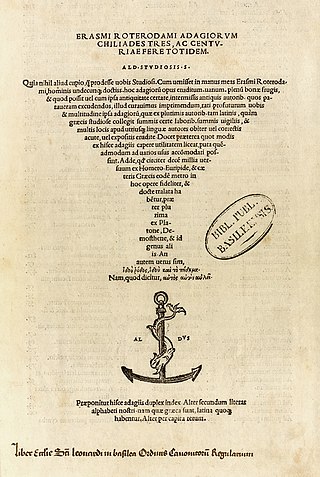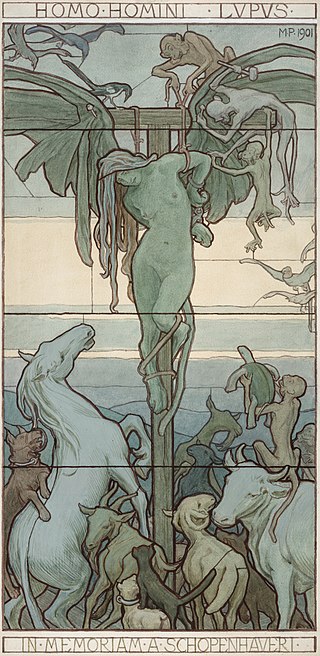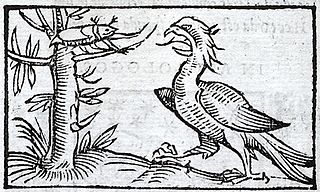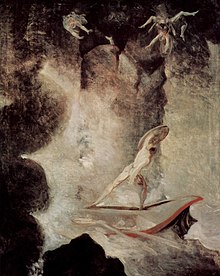Charybdis is a sea monster in Greek mythology. She, with the sea monster Scylla, appears as a challenge to epic characters such as Odysseus, Jason, and Aeneas. Scholarship locates her in the Strait of Messina.

A proverb is a simple, traditional saying that expresses a perceived truth based on common sense or experience. Proverbs are often metaphorical and use formulaic language. A proverbial phrase or a proverbial expression is a type of a conventional saying similar to proverbs and transmitted by oral tradition. The difference is that a proverb is a fixed expression, while a proverbial phrase permits alterations to fit the grammar of the context. Collectively, they form a genre of folklore.

In Greek mythology, Scylla is a legendary monster who lives on one side of a narrow channel of water, opposite her counterpart Charybdis. The two sides of the strait are within an arrow's range of each other—so close that sailors attempting to avoid Charybdis would pass dangerously close to Scylla and vice versa.
Walter of Châtillon was a 12th-century French writer and theologian who wrote in the Latin language. He studied under Stephen of Beauvais and at the University of Paris. It was probably during his student years that he wrote a number of Latin poems in the Goliardic manner that found their way into the Carmina Burana collection. During his lifetime, however, he was more esteemed for a long Latin epic on the life of Alexander the Great, the Alexandreis, sive Gesta Alexandri Magni, a hexameter epic, full of anachronisms; he depicts the Crucifixion of Jesus as having already taken place during the days of Alexander the Great. The Alexandreis was popular and influential in Walter's own times. Matthew of Vendôme and Alan of Lille borrowed from it and Henry of Settimello imitated it, but it is now seldom read. One line, referring to Virgil's Aeneid, is sometimes quoted:
The lesser of two evils principle, also referred to as the lesser evil principle and lesser-evilism, is the principle that when faced with selecting from two immoral options, the least immoral one should be chosen. The principle is sometimes recalled in reference to binary political choices in democratic voting under a two-party system.

Adagia is the title of an annotated collection of Greek and Latin proverbs, compiled during the Renaissance by Dutch humanist Desiderius Erasmus Roterodamus. Erasmus' repository of proverbs is "one of the most monumental ... ever assembled".

A rolling stone gathers no moss is a proverb, first credited to Publilius Syrus, who in his Sententiae states, "People who are always moving, with no roots in one place or another, avoid responsibilities and cares." The phrase spawned a shorter mossless offshoot image, that of the rolling stone, and modern moral meanings have diverged, from similar themes such as used in the popular song "Papa Was a Rollin' Stone", to a more complementary commentary on "freedom" from excessive rootedness, such as in the band The Rolling Stones.

The Alexandreis is a medieval Latin epic poem by Walter of Châtillon, a 12th-century French writer and theologian. It gives an account of the life of Alexander the Great, based on Quintus Curtius Rufus' Historia Alexandri Magni. The poem was popular and influential in Walter's own times: according to Henry of Ghent, it was more popular than Virgil's Aeneid in thirteenth-century schools. Translations were made into Old Spanish, Middle Dutch into Old Norse as the Alexanderssaga; Matthew of Vendôme and Alan of Lille borrowed from it and Henry of Settimello imitated it, but it is now seldom read. One line is sometimes quoted:

The Farmer and the Viper is one of Aesop's Fables, numbered 176 in the Perry Index. It has the moral that kindness to evil will be met by betrayal and is the source of the idiom "to nourish a viper in one's bosom". The fable is not to be confused with The Snake and the Farmer, which looks back to a situation when friendship was possible between the two.

Netherlandish Proverbs is a 1559 oil-on-oak-panel painting by Pieter Bruegel the Elder that depicts a scene in which humans and, to a lesser extent, animals and objects, offer literal illustrations of Dutch-language proverbs and idioms.
There's many a slip 'twixt the cup and the lip is an English proverb. It implies that even when a good outcome or conclusion seems certain, things can still go wrong, similar in meaning to "don't count your chickens before they hatch".

Homo homini lupus, or in its unabridged form Homo homini lupus est, is a Latin proverb meaning "Man is a wolf to man," or more literally "Man to man is wolf." It is used to refer to situations where a person has behaved comparably to a wolf. In this case, the wolf represents predatory, cruel, and generally inhuman qualities.

Shogun is the fourth studio album by American heavy metal band Trivium. The album was released worldwide on various dates between September 23, 2008, and October 1, 2008, through Roadrunner Records. It is their last release to feature original drummer Travis Smith. Work on the album is noted to have begun with producer Nick Raskulinecz in October 2007, with the band stating that they chose not to work with Jason Suecof again as they wanted to explore new ideas.

The proverbial expression of the mills of God grinding slowly refers to the notion of slow but certain divine retribution.

Pandora's box is an artifact in Greek mythology connected with the myth of Pandora in Hesiod's c. 700 B.C. poem Works and Days. Hesiod related that curiosity led her to open a container left in the care of her husband, thus releasing curses upon mankind. Later depictions of the story have been varied, with some literary and artistic treatments focusing more on the contents than on Pandora herself.
The phrase out of the frying pan into the fire is used to describe the situation of moving or getting from a bad or difficult situation to a worse one, often as the result of trying to escape from the bad or difficult one. It was the subject of a 15th-century fable that eventually entered the Aesopic canon.
The Two Pots is one of Aesop's Fables and numbered 378 in the Perry Index. The fable may stem from proverbial sources.
The Crow or Raven and the Snake or Serpent is one of Aesop's Fables and numbered 128 in the Perry Index. Alternative Greek versions exist and two of these were adopted during the European Renaissance. The fable is not to be confused with the story of this title in the Panchatantra, which is completely different.

The story of the feud between the eagle and the beetle is one of Aesop's Fables and often referred to in Classical times. It is numbered 3 in the Perry Index and the episode became proverbial. Although different in detail, it can be compared to the fable of The Eagle and the Fox. In both cases the eagle believes itself safe from retribution for an act of violence and is punished by the destruction of its young.

Skylla and Charybdis is a 2014 composition for piano quartet by Graham Waterhouse, played in four movements without a break. The title refers to Scylla and Charybdis, two sea monsters from Greek mythology. In performances in German-speaking countries, it has also appeared in English surroundings as Between Scylla and Charybdis.
















